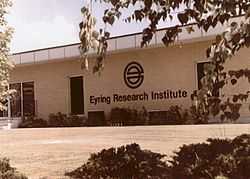Eyring Research Institute
Eyring Research Institute was founded as an American non-profit organization, on September 6, 1972, in Provo, Utah.
History

Carlyle Harmon established the Eyring Research Institute with Dr. Ronald G. Hansen as President. This Institute did consulting work in various areas of contract research in cooperation with BYU. ERI spawned many high-tech spin-offs, including WordPerfect, Novell, and Dynix in computers and some in the military and communication areas that have all benefited the world.[citation needed]
Being asked by BYU to assist them with their patent policy Carlyle Harmon was in a position to make suggestions as to research projects being funded at BYU.
I knew the government was clamping down hard on conducting research at educational institutions and I had a desire to build an institute to do contract research. I talked with Dr. Armin Hill, Dean of the College of Engineering and Technology at BYU. Following our discussions, it was determined to organize an entity that would actually do the work and get projects going. We felt that we could get enough part-time qualified BYU scientists working as supervisors to start our own research institute, and using this method we could do some worthwhile research.
I also worked closely with the President of BYU, Dallin Oaks, who has since been called to be an Apostle of the LDS Church.
I finally came up with “Eyring Research Institute” because Henry Eyring was the greatest scientist the LDS (Mormons) had produced. Henry Eyring said, “Anything I can do to help the Church, I will do." Henry Eyring also agreed to be one of our trustees and later was one of our directors.
Our first funded project is known as TISC (Totally Integrated Simulation Computer) and this AirForce program provided work for the Institute for over thirteen years of continuous funding. It was sponsored by the U.S. AirForce facility that simulates flights of the Minuteman II & III, and Migetman. In addition to TISC, we had two major multimillion dollar programs that have run for more than ten years, such as MDAS (Minuteman Data Acquisition System, and Missile Reliability System, both of which bring in data from every single missile in our missile force (“Star Wars” program). Much of our work became classified and more sophisticated and we enjoyed a remarkable reputation.
The Utah Supreme Court terminated ERI's tax exempt status in 1979 because the Court found that ERI was not devoted to a charitable purpose. In 1979 about 96% of the ERI's work was for the government including many top-secret projects and the remaining 4% was for private organizations. ERI was given to The Church of Jesus Christ of Latter-day Saints on July 31, 1979. Then, ERI was purchased back from the LDS Church beginning on August 1, 1979, creating it as a for-profit entity.
The focus of our new for-profit business was on four major technical divisions, which all reported to Admiral Hart, who had been with us since before the change from a not-for-profit company.
Carlyle Harmon stayed with ERI until 1988, “In 1988 I was squeezed out of my own Institute. I truly felt like a man without a country.”
Carlyle Harmon was complimented by President Ronald Reagan for his efforts in making the Reagan “Star Wars” Strategic Defense Initiative (SDI) Program for the Military.
Cleo Harmon, Carlyle’s wife, used to work as the Secretary to the President of ERI.
ERI Accomplishments 1972–1988
ERI performed research and engineering for the following:
- US Air Force – Intelligent Systems Software and Totally Integrated Simulation Computer
- Networking Systems – Novell and ARPANET networking protocols
- 3M Company – Process control manufacturing systems
- United Airlines - access control, security and safety monitoring system
- Chevron Research Park – security and safety monitoring system
- General Electric – warehouse system
- General Motors – “just-in-time” manufacturing and inventory control
- Compression Technology – sold by ERI
- PDOS – Sold by ERI
- Library Systems – Boulder, Pikes Peak, Marmot Project and Montgomery Library
- Tar Sands Research - U.S. Office of Coal Research
- Mushroom Processing Plant Study - Mountain Mushroom
- Human Language Technology – Weidner Communications DARPA/SISTO software and protocol development, WordPerfect
References
- Harmon, Cleo (1999). Hansen, Bliss J, ed. The Life of Frank Carlyle Harmon. Provo, Utah: Family Footprints. OCLC 45165221.
Coordinates: 40°14′40″N 111°41′04″W / 40.24444°N 111.68444°W